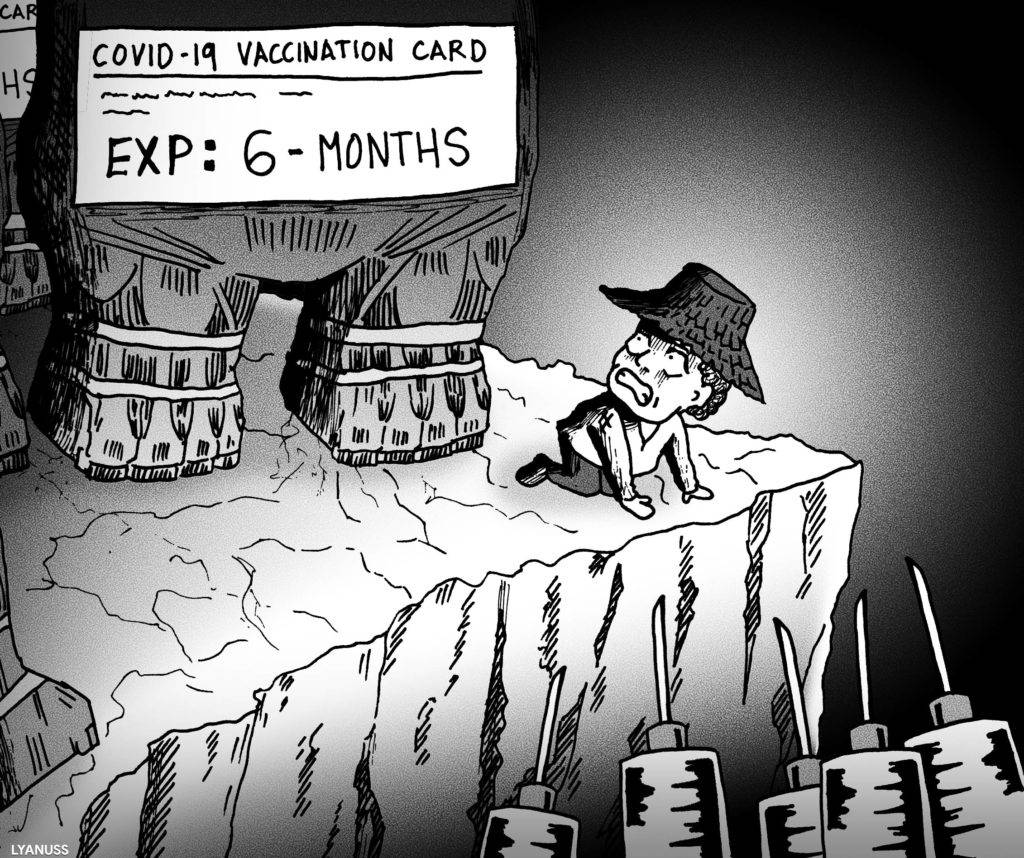by the Weekly Sillimanian | April 7, 2022

A few days ago, the Department of the Interior and Local Government (DILG) Undersecretary Epimaco Densing III said that the government is thinking of implementing a 6-month expiry date on COVID-19 vaccination cards. In addition, the chairperson of the National Vaccination Operations Center Health Undersecretary Myrna Cabotaje also said that this would be “a good strategy” to push Filipinos to keep their booster shots up-to-date.
However, citizens online have not responded to such a suggestion positively and the Weekly Sillimanian joins them in their sentiments.
First of all, the term “fully vaccinated” is already ambiguous and confusing enough. If the 6-month expiration date gets implemented, how does this change the definition of this term? Would people who have gotten the initial two doses of the vaccine get barred from being a part of this demographic just because they have not gotten any booster shots?
The government and some health experts and epidemiologists would argue that granting expiration dates to vaccination cards will help increase vaccination turnout, particularly with booster shots. About 27 million vaccine doses are set to expire this July, and a large amount of the population is yet to be inoculated with their booster shots.
However, despite the practicality of this planned undertaking, one must also consider the health conditions of every individual.
We must remember that some people have fewer options when it comes to the vaccine. For example, netizens expressed that they are worried about their friends and family that have been advised by their doctors to not get vaccinated due to underlying health reasons. However, because of requirements needed for school, travel, and more, they were pushed to take the risk and get vaccinated anyway. If the possible mandate were to be pushed through, more people with comorbidities would prioritize getting more shots to fulfill requirements over their health, increasing the chances of life-threatening reactions.
Many people also do not think the idea of the potential rule is based on justifiable bases. With the knowledge that 27 million vaccination doses will expire this July, they believe that the six-month expiration date would be counterproductive and target the wrong issues. While it is valid to ensure that our resources do not get wasted especially with the recent decline of our economy, persons of authority must think twice before making any decisions. Should we really risk the well-being of citizens with health conditions just to prevent resource waste?
Even if this idea did not stem from the fact that vaccine supplies will expire soon, such a mandate would still be an “iron fist” move that works because of fear. DILG USec. Densing, in his interview, said that this expiration strategy is to “force” people to get vaccinated or boosted. This essentially eliminates Filipinos to make the decision for themselves.
Some of you may argue that vaccines, specifically for COVID-19, have been proven to work and that everyone should get them anyway, regardless of the possible 6-month expiry. However, those who oppose the expiration date are not questioning the effectiveness of the vaccine. They are merely considering that vaccines, like all preventative health measures, have risks. Some people have allergies and conditions that react negatively to them — and we should not just ignore that possibility when making new rules.
Lawmakers and other people of authority, instead, should consult their constituents first before making drastic decisions. They must ensure that their choices do not benefit a mere percentage of people but all of them. Their duties, after all, are to protect all citizens.
The COVID-19 vaccine was developed to prepare one’s immune system for the relatively novel virus. Throughout history, vaccines for other viruses were also developed for the same objective and have proven their effectiveness to end epidemics and pandemics that have devastated humanity. Vaccines work, no doubt, but we must remember that everyone’s bodies have different needs and limitations. When potential mandates risk the well-being of a certain group of people, it is up to the rest of us to fight for their cause.


